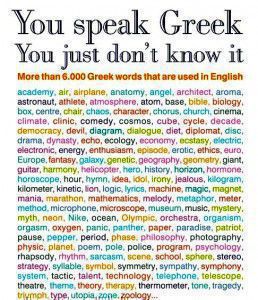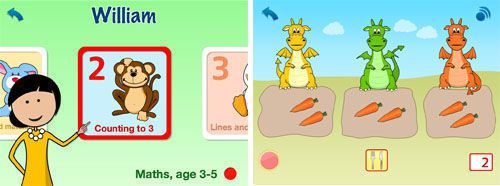Do you know who you’re talking to?
Our post today is by Izabella Klein, who’s been working with us to translate our maths apps into Brazilian Portuguese. Izabella’s post is about the importance of getting to know your target audience as a translator, and understanding more than just the words used.
Have you ever read an article, document or webpage in your own language that you can clearly see has been translated from another language? The sentences don’t really make sense, or have wordings that are not commonly used where you come from or where it’s been published. Do you get bored or lose interest because of this? I would say most likely yes!
There are two main reasons for this. One, it has been translated by a translation device. Or two, it has been translated by real people, but they were not careful to take into consideration the target public – you.
Reason number one I will disregard, because I strongly do not recommend this option for translation. But let’s go a bit deeper into reason number two, and look at why many translations are not handled carefully, to catch the attention of the readers, or even just make them understandable.
Let’s take the English language as an example. How many different countries in the world speak English as a first language? USA, England, Australia, some of Canada, some of Africa and even more. But, although it is all English, each one of them has a particular way of communicating; they use different words, they have different local parlance, slang and so on. Spanish is another language spoken worldwide as a first language; take Spain, Argentina, Colombia, Mexico, Chile, Peru, Venezuela and Ecuador for example. And even if we talk specifically about Spain, they still have other variations, such as Catalan and Galician.
So, even if someone is fluent in a specific language, that doesn’t mean they are capable of translating perfectly to that language in any place in the world where this is the native language. You must understand the minimum of their culture, their slang, and how they usually communicate something that you are interested in communicating to them.
I’ll take myself as an example. I’ve been working for Japanese people for the last couple of years as a linguist, using Portuguese and English as source and target languages. In the beginning it was a hard task. Much of what was said or written to me was difficult to understand: their awkward accent, the different words they used (words that are in the dictionary, but I’d never really heard people saying them on a daily basis), or incomplete sentences. So I had to get used to their weird English sentences, sometimes just random words that I had to put together like a puzzle and figure out the missing words. But, in the end, it was just a matter of adapting to their culture, or to JapanEnglish as I call it. Now, I feel 100% confident while working with them. I had to spend a year studing their different habits, and basically dig a way into making myself understandable in their language, in this case JapanEnglish.
You might say JapanEnglish is not really a language, but I argue that it is. It’s just a mixture of Japanese and English, the same way Catalan is a mixture of Spanish and French; and Galician a mixture of Spanish and Portuguese. The only difference is JapanEnglish is not an official language. My point here is that it’s important to realise why you must get to know your target public as deeply as possible, so that your translation work will be accurate.
I can also take my internship at EuroTalk as a second example of my work experience. I worked in app localisation, focused on teaching maths to very young children. Some might say it must have been an easy task. But actually it was not that easy. Children are different from adults, they use different vocabulary and they can easily get distracted. Plus, you can’t use a completely different vocabulary than teachers use at school, because the main idea is to reinforce what they will learn or are already learning at school; otherwise you might just confuse them, which will mean unhappy children and parents.
I know that for most linguists time is money, as it is for most people, but a piece of advice from what I have learned during my career is, take some time and effort to study your market. I believe that if you do, your chances of boosting your career are greater.
Izabella
The benefits of exposing younger children to multiple languages
Today we have a guest post by Stephen Thomas, on behalf of Pearson PTE, on why it’s important to expose children to other languages at a young age.
Why expose children to other languages?
Communication is fundamentally part of what makes us unique organisms on earth. The way that we have developed language to exchange concepts, ideas, narratives and so on with sounds that are culturally recognised to the degree of complexity we have, is distinctive and unmatched by any other organism.
Clearly then, learning a language reaps obvious benefits: we can learn and understand new things with ease, retain ideas throughout decades, make each other laugh and cry, discuss, debate and develop the most fundamental questions of philosophy – all through using just one language. So aside from the want or need to communicate with speakers of a different language, is there any benefit of being bilingual or raising children that are bilingual? Well, Pearson PTE spoke with Dr Catriona Morrison, senior lecturer in psychology at The University of Leeds who advised that there is evidence to support the notion that merely exposing children under the age of five to other languages has benefits, regardless of whether or not they become bilingual.
Between the age of 3 and 6 is a vital stage of childhood in terms of language learning and development. The malleable mind of a child
at this age is like a sponge and Dr Morrison advises that “after the age of five, it is highly unlikely to acquire the mother tongue of a language if it is not yet already acquired”. Although in later childhood or adult life we may learn a new language, we can be sure that we do not learn it with anything like the same ease that we would as a child. After this crucial point in child development there begins a change in the human brain that effectively shuts down the ability to ‘naturally’ learn language. Of course that doesn’t mean you can’t learn a language in adulthood, but if you have, I’m sure you will agree that it is much more difficult in contrast to a truly bilingual person (who learned two languages before this crucial stage) whereby the two languages are seamlessly managed within the brain as though they were one.
Beyond the communicative advantages, research suggests that bilingual children have better capacities for storytelling and interpretation. The processing of information seems to happen at a deeper level and they will think through and into the story more. So for example, statistically if we were to take a group of monolingual children and a group of bilingual children and tell them a story, when we ask them to recount the narrative and characters, the bilingual children will show evidence of deeper understanding and a higher level of information processing.
Furthermore, Dr Morrison suggested that bilingualism seems to act as a preventative mechanism against the onset of dementia or Alzheimer’s disease. Although it will not create immunity and one may still fall to the condition, statistically if it is going to happen it will happen later in life, when compared to monolingual sufferers. In layman’s terms this could be because one is using more of the brain when accessing two or more languages and thus the brain is more active, and an active mind is a healthy mind.
How can we help children to discover languages?
So if you are a monolingual parent and you see the benefits of bilingualism in younger children, how should you go about helping your child? Realistically, a child of monolingual parents isn’t going to become bilingual, even with partial immersion in other languages through accessing foreign television radio or sending them to a nursery that caters for multiple languages. This is why Dr Morrison agrees that it is such a tragedy that the UK’s schooling system doesn’t introduce children to other languages as it is at this vital time of youth that we have the change to expand their minds in a way that isn’t possible at any other stage of life.
However, this doesn’t mean that the exposure is pointless or irrelevant: “I have a lot of faith in the idea that the more languages a child is exposed to, the better,” says Dr Morrison. Part of what makes language learning hard is that a new language draws on an entirely alien phonemic inventory to what we are used to hearing. When we try to listen to and learn these sounds, our brain simply isn’t accustomed to hearing them. So there is definitely a benefit for parents endeavouring to expose children to these sounds that they would otherwise be starved of and therefore selectively excluded from the brain; absolutely do allow your children to watch foreign TV shows or listen to internet radio form other countries and if possible encourage human interaction with your child and other language speakers. This will only help and bolster their learning and development.
Stephen Thomas
If you’d like your children to start learning a language, why not try our Vocabulary Builder program? With its colourful characters and fun games, it’s a great start for young learners – and it’s available in over 100 languages.
So, did you know you can speak Greek?
Today’s blog post is written by Konstantia Sotiropoulou, who’s been helping us to translate and record our Maths apps in Greek.
I bumped into the picture below a while ago and I thought this should be interesting. Undoubtedly, Greek is one of the richest languages in the world and is distinguished by an extensive vocabulary. In the past, the Guinness Book of Records ranked the Greek language as the richest in the world with 5 million words and 70 million word types!

The front cover of You speak Greek, You just don't know it, a book by Annie Stefanides (Ianos, 2010)
Well, many of these words have been widely borrowed into other languages, including English. Greek roots are often used to coin new words for other languages, especially in the sciences and medicine. Mathematics, physics, astronomy, democracy, philosophy, athletics, theatre, rhetoric, baptism and hundreds of other words are Greek. Moreover, Greek words and word elements continue to be productive as a basis for coinages: anthropology, photography, telephony, isomer, biomechanics, cinematography, etc. and form, with Latin words, the foundation of international scientific and technical vocabulary, e.g. all words ending with –logy (“discourse”). Interestingly, an estimated 12% of the English vocabulary has Greek origin. Greek has contributed to English in several ways, including direct borrowings from Greek and indirectly through other languages (mainly Latin or French).
In a typical 80,000-word English dictionary, about 5% of the words are directly borrowed from Greek; this is about equivalent to the vocabulary of an educated speaker of English (for example, “phenomenon” is a Greek word and even obeys Greek grammar rules as the plural is “phenomena”). However, around 25% are borrowed indirectly. This is because there were many Greek words borrowed in Latin originally, which then filtered down into English because English borrowed so many words from Latin (for example, “elaiwa” in Greek evolved into the Latin “oliva”, which in turn became “olive” in English).
Greek and Latin are the predominant sources of the international scientific vocabulary. Greek is often used in coining very specialized technical or scientific words, however, so the percentage of words borrowed from Greek rises much higher when considering highly scientific vocabulary (for example, “oxytetracycline” is a medical term that has several Greek roots).
In education, an excellent way to build vocabulary is teaching students how to find roots in words. Since many words have their base in the Greek language, beginning with the roots from this ancient language is a good place to start. This list of English words with Greek origin will give students a basis for further exploration into the roots of the English language.
Now you that you have seen how many Greek words you know, I am going to teach you some more common ones like “kalimera” which means “good morning”, “Ya sou” which means “hi”, “Me lene” which means “my name is” and “efharisto” which means “thank you”. And if you are interested in learning more and discovering how many you already know, try EuroTalk’s uTalk Greek app.
And who am I to be talking about the Greek language? I am the Greek intern of EuroTalk, who translated and recorded into Greek their new Maths apps for young children. An interesting and fun experience for a young translator like me. I have to say that I really enjoyed working in this office, which gives you the sense of a family home. People here are calm and friendly, the kitchen is fully equipped with all kinds of snacks and during the day we get to listen to nice music while working! How amazing is that?
I started towards the end of January by translating the scripts of the app and soon after I recorded the first topics. I caught myself playing the app more than I needed to, as the games are really fun! I am sure young kids will truly enjoy it while learning basic Mathematics rules. And I know that my three-year-old niece, who will be playing the app in a few weeks, will at least have a constructive and educational first contact with technology!
So, whether you want to take up a new language or help your child have a nice start with Maths, you know that EuroTalk is here for you!
* There is an interesting video on YouTube that explains the History of English and the influence that it had from other languages!
Konstantia
Sorry Mickey! Dedicated Ben chooses JLC over Disneyworld
Nine year old Ben Fawcett will be cutting short his family holiday in Disneyworld to take part in this month’s Junior Language Challenge final.
Ben, who is the first pupil from Oakwood School near Chichester to get through to the final, had been due to be in Florida when the final of EuroTalk’s JLC takes place on October 21st.
His mum, Anna, says: “The timing couldn’t have been worse for us. We’re taking the children to Disneyworld for two weeks but Ben and I are only going for one week because the final is in the middle of our planned holiday.
“He’s disappointed but we gave him the choice and he said, ‘No Mummy, I’ve come this far – I want to do it,’ and I’m happy to fly back with him. But the timing couldn’t have been worse. We arrive back the day before the competition so he’ll probably be jet-lagged…”
Holiday plans apart, entering the competition has been a good thing for the Fawcetts.
Anna adds: “Children from Oakwood have made it through to the semi-finals before but not to the finals so Ben’s as proud as a peacock! It’s been really good for his confidence not just with languages but generally. He’s thoroughly enjoyed the competition and I’ve hardly had to remind him to look at the games.”
Having picked up some of the basics of Portuguese and Kazakh in the first two rounds of the competition, Ben is now one of around 40 finalists trying to get to grips with the last JLC language, Luganda.
Anna adds: “I’m obviously extremely proud of him but it’s completely nerve-wracking as well!”
We’re looking forward to seeing Ben and Anna at the final, which will be held at the Language Show next Friday.
Ben’s even made the local paper!
Are there any other semi-finalists out there who’d like to share their JLC story?
Is it OK to be Monolingual?
When England’s GCSE results came out at the end of August the British press were quick to report on the declining numbers of students taking the qualification in a foreign language: 12% fewer students than in 2010 sat the exam, and this is part of a continuing downward trend over the last few years. The vast majority took their GCSE in French, followed at some distance by Spanish and then German. Even the modest numbers taking Mandarin Chinese and Arabic have tailed off.
So, does this mean that we are well and truly on the road to become a nation of monolinguals, at ease communicating with the world in English, and more than happy to leave our dirty work to translators, interpreters and other specialists in the field? And does it matter?
A reason many UK experts state for learning a foreign language – the utilitarian one – suggests that having a language is good for business. However, I doubt that this has really had much of a detrimental effect on the bottom line of UK plc over the years and it is certainly not a motivating factor in persuading a 13 year old to learn Spanish. Although many employers prize a language qualification, the fact is that most jobs don’t require one.
So what about the appreciation of a country’s culture? Do you really need a knowledge of Italian to appreciate Renaissance art? Or of Chinese to understand the triumphs of the Ming Dynasty? It is entirely possible to promote awareness of these subjects in English.
I do think there are powerful reasons why young people should learn a language and the factors of interest to teenagers – the social ones, the sheer fun of it, the intrinsic joy of reaching into another world – are well set out at www.whystudylanguages.ac.uk. The question is: should all children be forced to take a language up to the age of 16?
Perhaps not all of them, if it depends on our current examination system and the knowledge it equips them with. That said, there are changes afoot in the secondary syllabus, and alternative language programs are also being pioneered in the UK. One of these works like music, on the basis of awarding progress through a step-by-step grades system.
And if formal education fails, many people find ways of acquiring language skills later in life, when they have a clearer idea of what they need to learn and why.
Steve




